Report: Seminar "Secularization, Religion, State" Session 13
On December 1st, the thirteenth session of the Seminar “Secularization, Religion, State” was held.
In this session Prof. Jean Baubérot (director emeritus of EPHE) delivered a lecture, titled “La laïcité en France: histoire et défies actuels.”
At first, Prof. Baubérot defined components of laïcité as “liberty of conscience and practicing it collectively (liberty of worship)” and “separation of religion from politics.” Then he described that there have been many kinds of laïcité in the world, and that it is not intellectual property of “any culture, any country, and any continent,” quoting 21st International Laïcité Manifesto. After confirming this prerequisite condition, he pointed out that laïcité is closely connected with French national identity and this point of view is effective in analyzing present crisis and change of French national identity.
According to him, laïcité in France started at the French Revolution in 1789 and passed three stages until today. In the first stage of laïcité (premier seuil de laïcisation), Napoléon made an agreement between Church and State. He approved Catholic as “religion of the majority of French people” while it was controlled by the state. Because of the conflict between moderate Catholic who distinguished religion between national identity and hard-liner, laïcité in France moved to the second stage (deuxième seuil de laïcisation). In 1905, Concordat relation came to an end and French national identity became based on laïcité thoroughly in the social system.
From 1960’s to 1980’s, laïcité entered the third stage (troisième seuil de laïcisation) against the background of the social change such as the end of Algerian War, settlement of the immigrants from North Africa, and rise of Islam. In the “veil problem” which occurred in 1989, veil was regarded as symbol of Islam, threat to the republic and laïcité. Although le Conseil d’Etat made a statement that the wear of religious item was not against laïcité unless it was “explicit” (ostentatoire), Laïcité Law was regulated in 2004. Under this law, the wear of religious item which is “outstanding” (ostensible) is forbidden in the place of the universal education. The prevailing opinion of the mass media is that Muslim people should value “the Republic” above their community. This social situation was caused by the Terrorist Attacks occurred in September 11th, 2001. Nicolas Sarközy, who became French president in 2007, is trying to keep distance from the French style Republicanism which apotheosizes the Republic and its value, and is showing devotion to the American style civil religion which regards the Creator as maker of human rights. He seems to try reinforcement the Republic by the “transcendence” because there is a need to compatibility of the unity of the social community with Multiculturalism. In conclusion, Prof. Baubérot described that the future of laïcité in France is still indeterminate. Attendants of the seminar raised a question regarding the definition of the word “outstanding” (ostensible) and risk of its stretch comparing to the case of Turky.
Reported by OTA Keiko






